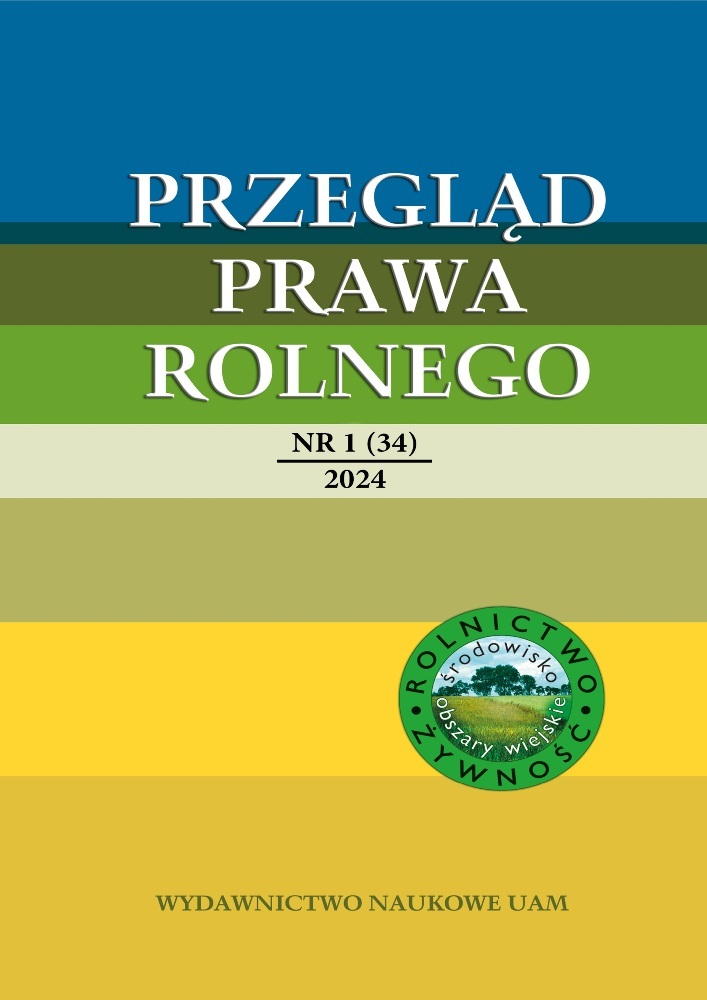Abstract
Thirty years ago, Professor Aleksander Lichorowicz wrote about family farming in the age of expanding agribusiness. The topic is still relevant today, both from the perspective of national, EU and international law. However, it has not been considered in the Polish literature from the perspective of an internationalist lawyer. In particular, it is therefore worth asking the question of the impact of national laws on the domestic policy towards family farming. The article undertakes an analysis of the WTO's agricultural law and policy and their impact on the activities of the Bretton Woods and IFAD institutions. At the same time, initiatives standing in opposition to the concept of agribusiness promoted within the WTO are presented. Of importance here is the identification of the impact of Via Campesina on the development of soft law under the auspices of the UN and FAO. It turns out that the development of soft instruments contributes to the growing importance of family farming at the international level, which does not necessarily entail a break with the direction pushed by the WTO. The remedy for this state of affairs would be to consider developing an international agreement on the protection of family farming.
References
Altieri M.A. (2008), Small Farms as a Planetary Ecological Asset: Five Key Reasons Why We Should Support the Revitalisation of Small Farms in the Global South, Penang.
Blondeau S., Korzenszky A. (2022), Family Farming, „Legal Brief” t. 8 (FAO).
Correa C. (2012), TRIPS-related Patent Flexibilities and Food Security: Options for Developing Countries. Policy Guide, QUNO-ICTSD, https://quno.org/resource/2012/9/trips-relatedpatent-flexibilities-and-food-security-options-developing-countries.
Cotula L., Vermuelen S., Leonard R., Keeley J. (2009), Land Grab or Development Opportunity? Agricultural Investment and International Land Deals in Africa, FAO-IIED-IFAD.
Deininger K., Byerleewith D., Lindsay J., Norton A., Selod H., Sticklers M. (2011), Rising Global Interest in Farmland: Can It Yield Sustainable and Equitable Benefits?, Washington DC. DOI: https://doi.org/10.1596/978-0-8213-8591-3
Faraoni V. (2021), Rethinking the Right to Food: How the Food Sovereignty Movement (Via Campesina) Challenges the Human Rights System, Padova.
Gonzalez C.G. (2002), Institutionalizing Inequality: The WTO Agreement on Agriculture, Food Security, and Developing Countries, „Columbia Journal of Environmental Law” t. 27.
Gulali N., The World Bank in Africa: An Analysis of World Bank Aid and Programmes in Africa and Their Impact, https://www.realityofaid.org/wp-content/uploads/2018/12/1-The-World-Bank-in-Africa-An-analysis-of-World-Bank-aid-and-programmes-in-Africa-and-their-impact.pdf.
Halamska M. (2014), Współczesne rolnictwo rodzinne: polimorficzna rzeczywistość i mity, „Wieś i Rolnictwo” nr 2 (163).
Johnson H. (2018), International Agricultural Law and Policy: A Rights-Based Approach to Food Security, Cheltenham.
Késmárki-Gally Sz.E., Fenyvesi L. (2012), Tendencies and Challenges in Global Agriculture, „Problems of World Agriculture” nr 12 (3). DOI: https://doi.org/10.22630/PRS.2012.12.3.37
Lichorowicz A. (1996), O instytucji rodzinnego gospodarstwa rolnego, „Rejent” nr 7/8.
Lichorowicz A. (2000), Status prawny gospodarstw rodzinnych w ustawodawstwie krajów Europy Zachodniej, Białystok.
Łukaszewicz A. (2012), Grabież ziem uprawnych (land grabbing) jako nowa forma imperializmu, „Wieś i Rolnictwo” nr 4 (157).
Martínez-Torres M.E., Rosset P.M. (2010), La Vía Campesina: the Birth and Evolution of a Transnational Social Movement, „The Journal of Peasant Studies” t. 37 (1). DOI: https://doi.org/10.1080/03066150903498804
Mittal A., Kawaai M., Freedom to Trade? Trading Away American Family Farms, https://www.oaklandinstitute.org/freedom-trade-trading-away-american-family-farms.
Oke E.K. (2020), Do Agricultural Companies that Own Intellectual Property Rights on Seeds and Plant Varieties have a Right-to-Food Responsibility?, „Science, Technology & Society” t. 25. DOI: https://doi.org/10.1177/0971721819890043
Pastuszko R. (2017), Land grabbing. Podstawowe zagadnienia prawne, „Studia Iuridica Lublinensia” t. 26, nr 1. DOI: https://doi.org/10.17951/sil.2017.26.1.147
Ritchie M., Dawkins K. (2000), WTO Food and Agricultural Rules: Sustainable Agriculture and Human Rights to Food, „Minnesota Journal of Global Trade” t. 9.
Schutter O. de (2009), International Trade in Agriculture and the Right to Food, „Dialogue on Globalization” nr 46.
Schutter O. de (2009), Seed Policies and the Right to Food: Enhancing Agrobiodiversity and Encouraging Innovation, A/64/170. Report presented to the UN General Assembly (64th session).
Srogosz T. (2011), Political Rights in Law and Practice of the World Bank, w: B. Sitek, J. Szczerbowski, A. Bauknecht, G. Dammacco (red.), Human Rights, Spriritual Values and Global Economy, South Jordan.
Srogosz T. (2020), Międzynarodowe prawo żywnościowe, Warszawa.
Vapnek J., Boaz P. (2021), Legislative and Regulatory Frameworks for Family Farming, „FAO Legal Papers” nr 108.
Wender M.J. (2011), Goodbye Family Farms and Hello Agribusiness: The Story of How Agricultural Policy is Destroying the Family Farm and the Environment, „Villanova Environmental Law Journal” t. 22.
License
Copyright (c) 2024 Tomasz Srogosz

This work is licensed under a Creative Commons Attribution 4.0 International License.





